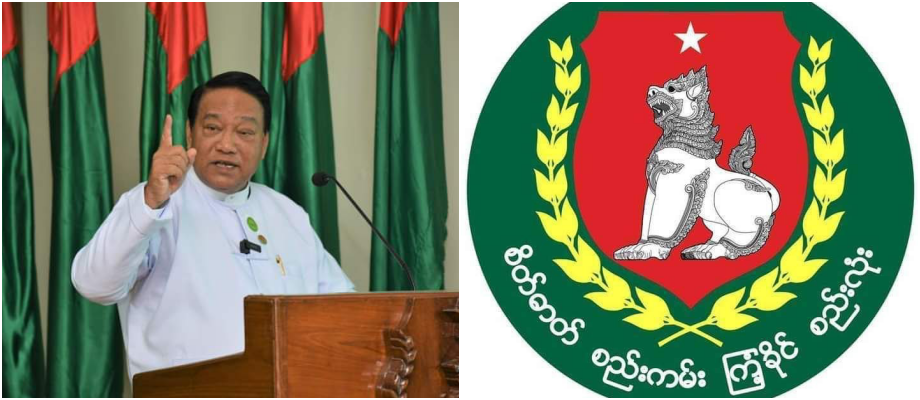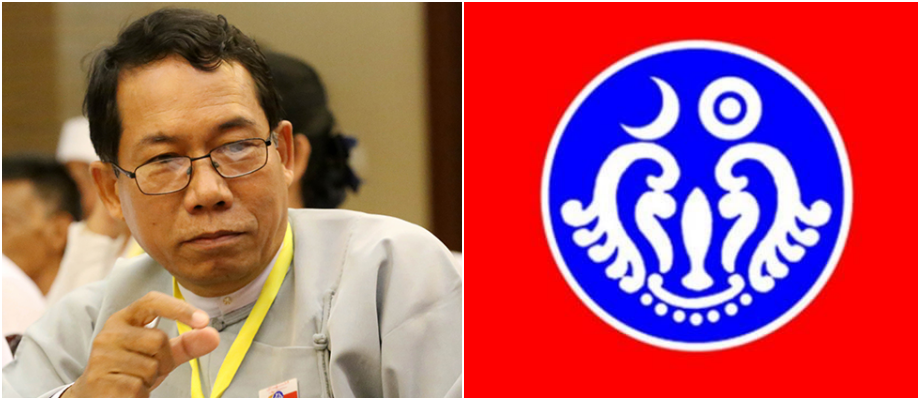Late last month, Myanmar’s military regime enacted the new Political Parties Registration Law requiring parties to re-register with the junta-appointed Union Election Commission within two months or face dissolution. So far, 13 out of over 90 political parties have re-registered with the junta’s election body.
Parties that have re-registered include the military’s proxy Union Solidarity and Development Party (USDP), the Pa-O National Organization (PNO), National Unity Party (NUP), Arakan Front Party (AFP), New Democracy Party (Kachin), Phalon-Sawaw Democratic Party, New National Democracy Party (NNDP), Public Service Students Party (PSSP), and Democratic Forces Labour Party.

The Shan Nationalities Democratic Party (SNDP), Democratic Party (Myanmar), and United Democratic Party have also re-registered under new names.
Five of the parties are running nationally and the eight others in their regions and states, according to the junta-appointed UEC.
On Feb. 25, the Arakan League for Democracy (ALD) decided not to re-register. The ALD is one of the three major parties based in Rakhine. The others are the AFP and the Arakan National Party.
Meanwhile, the National United Democratic Party led by former National League for Democracy lawmaker U Sein Win, better known as Maubin Sein Win after the Ayeyarwady Region constituency he represented, said the party will be dissolved to merge with the People’s Party led by 88-Generation student leader U Ko Ko Gyi. The latter said he would announce the newly merged party at a press conference on Thursday.

Controversial politician U Kyaw Zeya, an ex-military lieutenant colonel who served as an NLD lawmaker in Yangon Region’s Parliament, is launching the Union Peace and Unity Party together with fellow former NLD lawmakers, after resigning as vice chairman of the People’s Pioneer Party (PPP) led by junta social welfare minister Daw Thet Thet Khine.
Rumors of a merger between U Kyaw Zeya and Maubin Sein Win, both of whom quit the NLD after rowing with its leadership, have been dismissed by both sides.

Among the 13 parties that have re-registered, the USDP, Federal Democratic Party (FDP), MPD, PNO, NUP, NNDP, and PSSP were among 34 parties that met military chief Min Aung Hlaing ahead of the 2020 general election.
The party leaders sought the commander-in-chief’s assurance that he would intervene if voting was deemed unfair. They also called for then UEC chairman U Hla Thein to be replaced, saying they do not trust him because he was appointed by the NLD.
The Democratic Party (Myanmar) has re-registered as the Federal Democratic Party. Its leaders Daw Than Than Nu and Daw Cho Cho Kyaw Neyin accepted honorary titles on behalf of their fathers from Min Aung Hlaing in January in Naypyitaw. Daw Than Than Nu is the daughter of the late U Nu, prime minister in the Anti-Fascist People’s Freedom League government after independence from British rule.

The United Democratic Party, known as the Rose party because of its logo, was dissolved ahead of the 2020 election after its chairman Michael Kyaw Myint was accused of money laundering, flouting business laws and fleeing a prison sentence handed down under the previous military regime. It has re-registered with the UEC under a new name, the Union Democracy Party.
Shan Nationalities Democratic Party meanwhile has re-registered as the Shan and Ethnic Democratic Party. Its chairman Sai Ai Pao was granted the honorary title of Thiri Pyanchi by Min Aung Hlaing. The party split from the Shan Nationalities League for Democracy (SNLD) in 2010 to contest the general election organized by the then military junta, after the SNLD boycotted the election.

The PNO has as its vice chairman Khun San Lwin, who sits on the junta’s governing body, the State Administration Council (SAC). The NNDP is led by U Thein Nyunt, who was an SAC member and was recently promoted to the SAC’s Central Advisory Body.
The USDP was famously founded by former dictator Than Shwe as the military’s political wing. The NUP is also the successor of the Burma Socialist Programme Party (BSPP), which ruled the country from 1962 to 1988 as a single party led by Myanmar’s first military dictator, Ne Win.

The AFP is led by Dr. Aye Maung, who was handed a long jail sentence for treason under the now-ousted NLD government but pardoned and released by junta chief Min Aung Hlaing in 2021. The Rakhine politician reportedly advised the Rose party to re-register under a new name with the UEC.
It is fair to say, then, that all of the re-registered parties enjoy close ties with the regime.
The new law signed into effect by Min Aung Hlaing on Jan. 26 requires national parties to recruit at least 100,000 members within 90 days of registration, open offices in at least half of Myanmar’s 330 townships within six months, and contest in at least half of all constituencies. Observers say only parties with ties to the regime can survive under such restrictions.
Sai Leik, general secretary of the SNLD, told The Irrawaddy that the law effectively guarantees the USDP will win power and cement the military’s grip on politics.

The USDP was the first party to re-register with the UEC.
The National League for Democracy, whose leaders including Daw Aung San Suu Kyi remain in regime jails, says it will not recognize any junta election. Other pro-democracy parties are also unlikely to contest any poll held under military rule. But more parties – including the PPP and National Democratic Force led by U Khin Maung Swe, a member of the SAC’s central advisory body – look set to re-register.
In the 2020 election, which the NLD won by a landslide, 87 of 91 registered parties contested and 19 won parliamentary seats. The number of parties likely to contest the junta’s proposed poll this year is far fewer, thanks to the restrictive registration law and widespread mistrust in the election.

















